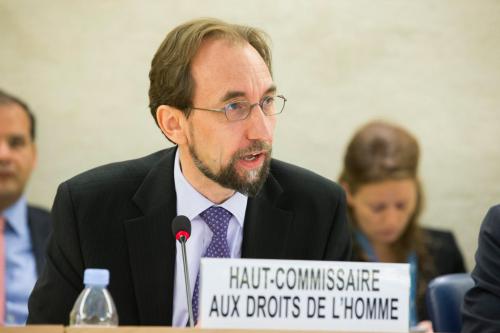War crimes trial for former Chadian leader ‘a milestone for justice in Africa’ – UN rights chief
The United Nations High Commissioner for Human Rights, Zeid Ra’ad Al Hussein, welcomed the opening of the trial of Hissène Habré, the former President of Chad – who is accused of crimes against humanity – before a special court in Senegal, calling it “a milestone for justice in Africa” on July 20.

High Commissioner for Human Rights Zeid Ra’ad Al Hussein.
Mr. Zeid said in a press release that the trial, before the Extraordinary African Chambers, was of tremendous significance in a number of ways.
“It was the victims’ remarkable and tireless quest for justice and accountability for the gross human rights violations committed during Habré’s eight-year rule which made it possible for this trial to take place, more than 25 years after he left office and found refuge in Senegal.”
On 22 August 2012, Senegal and the African Union (AU) signed an agreement establishing the Extraordinary African Chambers in the Senegalese justice system to try alleged perpetrators of international crimes committed in Chad between 1982 and 1990 – including genocide, crimes against humanity, war crimes, and torture.
The UN human rights chief praised the unprecedented agreement as “a historic example of regional leadership and willingness to fight against impunity for international crimes.”
“This shows that leaders accused of serious crimes should not assume they can evade justice forever,” he underscored. “Nowadays, there is a good chance their crimes will eventually catch up with them.”
The High Commissioner noted that his Office, which over the past few years has actively supported accountability efforts in Senegal and Chad, will also closely monitor the trial’s progress.
Mr. Zeid also welcomed the ongoing outreach efforts deployed by the special court in Chad ad “fundamentally important” in establishing “a clear two-way communication between the special court in Senegal and the Chadian population,” to ensure that the conduct of the trial “breeds a real sense of ownership and justice within Chad itself.”
Source: United Nations
- 412 reads
Human Rights
Fostering a More Humane World: The 28th Eurasian Economic Summi

Conscience, Hope, and Action: Keys to Global Peace and Sustainability

Ringing FOWPAL’s Peace Bell for the World:Nobel Peace Prize Laureates’ Visions and Actions

Protecting the World’s Cultural Diversity for a Sustainable Future

Puppet Show I International Friendship Day 2020

